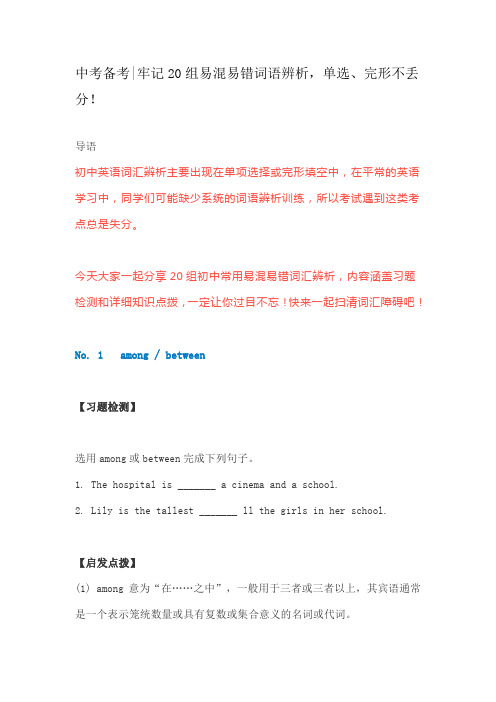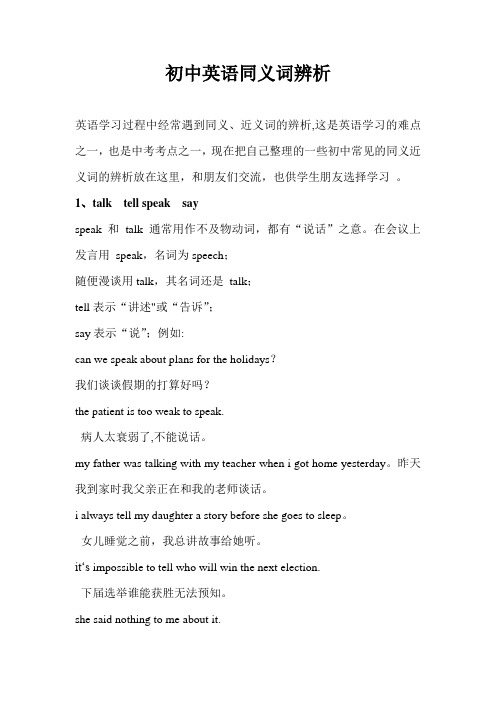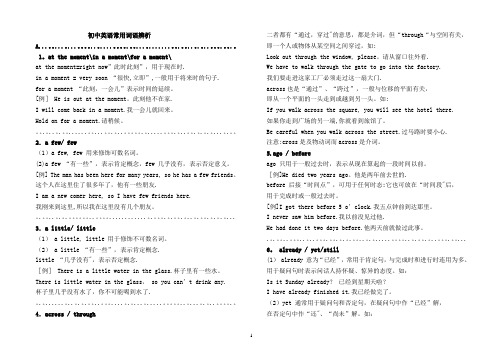初中英语常用词语辨析
英语中考牢记20组易混易错词语辨析

中考备考|牢记20组易混易错词语辨析,单选、完形不丢分!导语初中英语词汇辨析主要出现在单项选择或完形填空中,在平常的英语学习中,同学们可能缺少系统的词语辨析训练,所以考试遇到这类考点总是失分。
今天大家一起分享20组初中常用易混易错词汇辨析,内容涵盖习题检测和详细知识点拨,一定让你过目不忘!快来一起扫清词汇障碍吧!No. 1 among / between【习题检测】选用among或between完成下列句子。
1. The hospital is _______ a cinema and a school.2. Lily is the tallest _______ ll the girls in her school.【启发点拨】(1) among意为“在……之中”,一般用于三者或三者以上,其宾语通常是一个表示笼统数量或具有复数或集合意义的名词或代词。
(2) between一般指两者之间,其宾语通常是表示两者概念的名词或代词,或由and连接的两个具体的人或物。
between有时也可表示多者之中的“两两之间”。
如:Switzerland lies between France, Germany, Austria and Italy.Key:1. between2. amongNo. 2 lay / lie【习题检测】用lay或lie的适当形式完成句子。
1. I _______ the table when my mother cooked the meal.2. John was ill and _______ in bed all morning.【启发点拨】(1) lay作动词,可意为“摆放(餐桌)”,其过去式与过去分词均为laid,现在分词为laying,常用于短语lay the table,意为“摆放餐桌”。
如:Tom was laying the table.(2) lie作动词,意为“躺;平躺”时,过去式为lay,过去分词为lain,现在分词为lying。
初中英语300组常用词语辨析完整版

初中英语300组常用词语辨析Lesson495.bloom/flower/blossomⅠ.bloom指观赏用的花。
如:玫瑰;菊花;牡丹等。
Ⅱ.flower是普通用语。
Ⅲ.blossom指果树上的花。
96.boat/shipⅠ.boat“船、艇,”是普通用语。
主要指用浆、篙、帆或引擎的小船、小艇,但有时也指大轮船。
如:1We crossed the river by boat.我们乘船过河。
2They pulled the boat up on to the shore.他们把这条船拖上了岸。
(指小船③When does the boat leave for Shanghai?(指轮船Ⅱ.ship“船、舰,”多指大的航海船只。
如:1The ship is at sea.船厂在航海。
2They went to Guangahou by ship.他们乘船去广州。
97.bold/brave/courageousⅠ.bold“大胆的、勇敢的”着重指大胆、勇敢的气质,表现出有胆量、敢闯或敢于对抗而不畏缩。
如:1Be bold!勇敢些!2It’s very bold of us to v enture to go to sea.我们冒险航海是很勇敢的。
Ⅱ.brave“勇敢的”,应用最广泛,通常指在危险、困难或可怕的情况下表现勇猛而畏缩。
如:1Be brave!勇敢些!2It was brave of him to enter the burning building.他敢进入那燃烧着的房屋,真是勇敢。
Ⅲ.courageous“勇敢的,无畏的”表示由于有勇敢的气质或不屈不挠的精神而能无畏地自觉地对付某种事情,常常用于表示道义上的勇敢。
如:1He is courageous in telling the truth.他敢于讲实话。
2We hope that they will courageously shoulder their responsibilities and overcome all difficulties.我们希望能够勇敢地负起责任,克服一切困难。
最新初中英语高频词汇辨析500组

最新初中英语高频词汇辨析500 组A1.about around round 作副词时都含“四处” 、“遍地”的意思。
about系常用词,如: look about around 具有about的基本意思,没有about 正式 , 如 : travel around四处看。
因此look about=look around, 但在下列短语里各处旅行aroundround和 around 在非正式用法中可以互换, 但一般用round时更简练。
在正式用语中, 一般用round指“旋转”, 而用around指“处处”, “到处”, 如 :She turned round at such a noise.听到这样的吵声, 她回头看。
I have been looking for it all around.我到处都找过了。
另外 , 英国人用round 的地方 , 美国人倾向于用around,如:[英 ] Winter comes round.[美 ] Winter comes around.2. above all; after all ; at allabove all 意为“尤其是” 、“首先”、“最重要的是” ,常位于句首或句中,作插入语,起强调作用。
如:But above all tell me quickly what I have to do.可首先快些告诉我该做什么。
A clock must above all keeps good time .时钟最重要的是必须走得准。
after all 意为“毕竟” 、“终究”、“终归”、“到底”,在句中位置较灵活。
可位于句首、句中或句末。
如:After all , your birthday is only two weeks away .毕竟,两周后就是你的生日。
He is, after all , a small child .他毕竟还是个小孩子。
初中英语相似词语辨析(一)

初中英语相似词语辨析(一)第一刊第一部分1.a/anThis is a banana.这是香蕉。
That's an apple.那是苹果。
<辨析> a 用在以辅音音素开头的词前,an 用在以元音音素开头的词前。
这里所说的是音素,而不是字母。
注意:1) 书写以辅音字母开头,发音以元音音素开头的单词前面用 an .如:an hour 一小时;an honest girl 一个诚实的女孩.辅音字母f,h,l,m,n,r,s,x 单独使用时因它们的发音都分别以元音开头其前面用 an 。
如:an"l",一个"l"。
2)书写以元音字母开头发音以辅音音素开头的单词前面用 a 。
如:a useful book一本有用的书。
2.a/oneThere is a glass on the table.桌上有只玻璃杯。
There is one glass on the table.桌上有一只玻璃杯。
<辨析> 不定冠词a 和数词one 都可以修饰单数可数名词,表示“一”或“一个”。
a 着重指类别,表示同类事物中的任何一个,有泛指的意义,不一定要译出。
one着重指数量,是与two,three等数词相对而言的。
试比较:I have a pen.(意即我有的是笔,不是其它什么东西。
)I have one pen.(意即我有一枝笔,不是两枝,三枝。
)a 和one 还有如下异同:1)表示“每一”含义时,用a 不用one 。
如:We have five English classes a week.我们每周上五节英语课。
I drink tea three times a day.我一天喝三次茶。
2)表示编号时,用one 不用a 。
如:Are you in Grade One? 你在一年级吗?3)在“一”和其它数量词接连出现时,两者可互换,但表示强调对比时,用one 不用a 。
初中英语同义词辨析

初中英语同义词辨析英语学习过程中经常遇到同义、近义词的辨析,这是英语学习的难点之一,也是中考考点之一,现在把自己整理的一些初中常见的同义近义词的辨析放在这里,和朋友们交流,也供学生朋友选择学习。
1、talk tell speak sayspeak 和talk 通常用作不及物动词,都有“说话”之意。
在会议上发言用speak,名词为speech;随便漫谈用talk,其名词还是talk;tell表示“讲述"或“告诉”;say表示“说”;例如:can we speak about plans for the holidays?我们谈谈假期的打算好吗?the patient is too weak to speak.病人太衰弱了,不能说话。
my father was talking with my teacher when i got home yesterday。
昨天我到家时我父亲正在和我的老师谈话。
i always tell my daughter a story before she goes to sleep。
女儿睡觉之前,我总讲故事给她听。
it‘s impossible to tell who will win the next election.下届选举谁能获胜无法预知。
she said nothing to me about it.关于这一点,她什么也没有对我讲.*speak 当及物动词用时,宾语一般是语言或词语之类的词。
如: does anyone speak english here?这儿有人会说英语吗?2、good well nicegood 形容词,好的,合适的,新鲜的,擅长的。
well 作形容词时,指"(身体)健康的”;还可用作副词,修饰动词。
nice形容词,美好的,令人愉快的,可爱的,特指取悦感官的事物。
she is good at english。
她擅长英语。
初中英语重点词语辨析:good, well, nice

good, well, nice
这三个词都表示好的意思,但它们在词性和修饰的对象方面有所不同。
good,好,是形容词用来修饰名词,如good news好消息;good points优点;a good year好年成。
如:
She is a good singer.她是一个好歌手。
well,好、令人满意地,是副词,用来修饰动词,如well done干得好,live well生活得好。
如:
Kate doesnt sing well, but she dances well.
凯特唱不好,但她舞跳得很好。
表示身体健康要用well不good,这时well是形容词。
如:
Im feeling very well today.我今天感觉身体很好。
nice,好的,好看的,是形容词,用来修饰名词。在表示好的含义与good不一样。如a nice girl一个好看的姑娘;nice weather好天气。nice也可以表示愉快的,但在修饰程度上与good不一样。
如:
He was very nice to me.他对我真好。
初中英语300组常用词语辨析(3)

初中英语300组常用词语辨析(3)§201grow / keep / raise / plantⅠ. grow & plant 都可表示“种植”如种植草、树、苗、花卉粮食等植物。
grow 着重指种植以后的栽培、管理过程。
plant 着重指“种植”这一行为。
某人plant a tree 之后,树是死是活,不一定管,但某人grow a tree 则包括培育管理,使其生长的过程。
如:① The students are planting trees on the hill. 学生们正在山坡上栽树。
(不用grow ) ② The farmer grows wheat in this field.那位农民在这块田里种植小麦。
(不用plant ) ③ People grow bananas in Hainan. 海南种植香蕉。
(不用plant )Ⅱ. keep 表“赡养”后可接表人或动物的名词,不用来代替plant 或grow. 如: He has a wife and three children to keep. 他要养活妻子和三个孩子。
Ⅲ. raise 除表“饲养(动物)”以外,还可表示“教育(子女)”; “培育(植物)”。
如: Where were you raised ? 你在哪儿长大?[注]:raise 强调从小精心培养到大,通常指培养花卉以及较难管理的植物。
如:Let ’s grow / raise some flowers in the garden.咱们在园子里种些花吧。
We grow rice, wheat and cotton in my hometown. 在家乡,我们种植水稻、小麦和棉花。
(不宜用raise )§202 glad/ happy/merry/ pleased 这组形容词都有:“高兴、快乐”之意。
Ⅰ.glad 多用在与人见面时的客套语中,指使人感到:情绪上有短暂的喜悦,常用作表语,一般情况下不作定语。
初中英语常用词语辨析大全

初中英语常用词语辨析A...。
...。
...。
..。
....。
.。
...。
.......。
.。
..。
.。
..。
.。
.。
1。
at the moment\in a moment\for a moment\at the moment=right now”此时此刻”,用于现在时.in a moment = very soon “很快,立即”,一般用于将来时的句子.for a moment “此刻,一会儿”表示时间的延续。
[例] He is out at the moment。
此刻他不在家.I will come back in a moment.我一会儿就回来。
Hold on for a moment.请稍候。
.。
..。
.。
......。
...。
.。
..。
.。
.....。
.。
..。
.。
.。
.。
...。
.。
2.a few/ few(1)a few, few 用来修饰可数名词。
(2)a few “有一些”,表示肯定概念,few 几乎没有,表示否定意义。
[例] The man has been here for many years, so he has a few friends。
这个人在这里住了很多年了,他有一些朋友.I am a new comer here, so I have few friends here.我刚来到这里,所以我在这里没有几个朋友。
.。
..。
.。
.。
..。
............。
.。
.。
.。
.。
..。
.。
.。
.。
.。
... 3.a little/ little(1) a little, little 用于修饰不可数名词。
(2) a little “有一些”,表示肯定概念.little “几乎没有",表示否定概念.[例] There is a little water in the glass.杯子里有一些水。
There is little water in the glass, so you can’t drink any.杯子里几乎没有水了,你不可能喝到水了. 。
- 1、下载文档前请自行甄别文档内容的完整性,平台不提供额外的编辑、内容补充、找答案等附加服务。
- 2、"仅部分预览"的文档,不可在线预览部分如存在完整性等问题,可反馈申请退款(可完整预览的文档不适用该条件!)。
- 3、如文档侵犯您的权益,请联系客服反馈,我们会尽快为您处理(人工客服工作时间:9:00-18:30)。
词语辨析big, large & great你知道big, large与great的区别吗?请仔细观察下面的例句,然后补全结论部分所缺的内容。
【例句】This is a big / large room.这是一个大房间。
He is a big boy now.现在他是个大孩子了。
China is a large and beautiful country.中国是个大而美丽的国家。
What great fire! 好大的火呀!He is a great writer.他是个伟大的作家。
【结论】big, large与great都有“_______”的意思,其中big多指体积、重量、程度等;large常用于面积、范围、数量,二者有时可互换使用;great指体积或面积大时带有感情色彩,表示大得惊人或给人深刻的印象,指人或物时,则表示“伟大的,巨大的”。
【运用】用big, large或great填空。
1. They live in a _________ house.2. That boy is _________ for his age.3. Yao Ming is a _________ basketball player.词语辨析[结论] 大的[运用] 1. large / big 2. big 3. great词语点击★special ★仔细观察下面例句中special的用法,然后补全结论部分所缺的内容。
【例句】1. There are daily specials to choose from.每天都有特色菜供选择。
2. There is a special on coffee this week.本周咖啡特价。
3. This kind of coat is on special today.这种上衣今天特价出售。
4. This is a very special case.这是一个非常特殊的例子。
【结论】1. special用作名词时,意思是“_________;特价”,如例句1和例句2。
_________ 意思是“以特价出售”,如例句3。
2. special用作形容词,意思是“特别的,_________”,如例句4。
【运用】根据汉语意思写出英语句子。
1. 我们今晚有一些特色菜。
__________________________________2. 他有一辆特别的自行车。
__________________________________3. 冰淇淋本周特价出售。
__________________________________★size ★你知道size的用法吗?请仔细观察下面的例句,然后补全结论部分所缺的内容。
【例句】1. What size bowl of noodles would you like?你要多大碗的面条?2. What’s the size of your room?你的房间有多大?3. There are all sizes of shoes in our shop.我们店有各种号码的鞋。
4. Size the shoes from small to large.把鞋按尺寸从小到大排列。
【结论】1. size作“_________,尺寸,_________”讲时,多用作可数名词,如例句1、例句2和例句3。
2. size 可用作_________,意为“按尺寸排列”,如例句4。
【运用】根据汉语意思写出英语句子。
1. 你穿多大号的鞋?__________________________________2. 你知道他房间的尺寸吗?__________________________________3. 请把那些裙子按尺寸排列!__________________________________词语点击special[结论] 1. 特色菜,on special 2. 特殊的[运用] 1. We have some specials this evening.2. He has a special bike.3. Ice cream is on special this week.size[结论] 1. 大小,号码 2. 动词[运用] 1. What size shoes do you wear?2. Do you know the size of his room?3. Size those skirts, please!词语讲坛1. I would like a glass of orange juice.我想喝杯橙汁。
2. He’d like to go to the vid eo shop with us this afternoon.今天下午他想和我们一起去音像店。
3. —Would you like a cup of tea?你想要杯茶吗?—Yes, please. 是的。
/ No, thanks. 不,谢谢。
[用法归纳]1)would like没有人称和数的变化。
用于委婉地提出请求、建议或陈述想法、看法。
2)would like后可以跟名词、代词或动词不定式。
并可缩写为’d like。
3)询问某人是否想要某物时,常用Would you like...?(你想要……吗?)这一句型。
通常肯定回答为Yes, please;否定回答为No, thanks。
[巩固训练]请按要求完成下列句子。
1. A: _______________________________?(根据答语写出问句)B: I’d like beef and tomato noodles.2. A: _______________________________?(根据答语写出问句)B: I’d like a medium bowl of noodles.3. The girl wants some orange juice.(改为同义句)__________________________________.4. Would you like some dumplings?(作肯定回答)__________________________________.5. Would you like some chicken?(作否定回答)__________________________________.参考答案1. What kind of noodles would you like2. What size bowl of noodles would you like3. The girl would like some orange juice4. Yes, please5. No, thanks1. 【原文再现】What kind of noodles would you like?【要点点拨】kind用作名词时,意思是“种类,类型”,常与介词of连用。
如:They have all kinds of books.他们有各种各样的书。
在询问“哪种/ 什么类型”时,一般用“What kind of...”。
如:What kind of fruit do you like? 你喜欢哪种水果?①你有哪种计算机?________________________________2. 【原文再现】Beef and tomato noodles, please.【要点点拨】当名词作定语修饰另一个名词时,不论被修饰的名词是单数还是复数,作定语的名词通常要用单数形式;但当man或woman作定语时,要与所修饰的名词的单复数保持一致。
如:two apple trees 两棵苹果树,ten men workers 十名男工人【句子仿写】②我想要一个苹果口味加橘子口味的冰淇淋。
________________________________③我们学校有20名女教师。
________________________________3. 【原文再现】Can I help you?【要点点拨】这句话是商店、宾馆、饭店等场所的服务员与顾客打招呼时的用语。
要根据具体的场合进行翻译。
如:—Can I help you? 你想买点什么?—I’d like some apples. 我想买一些苹果。
【句子仿写】④—你想吃点什么?—我要一小碗面条。
—______________________________—______________________________4. 【原文再现】I don’t like onions, green tea or porridge.【要点点拨】在肯定句中,并列成分的列举一般用and来连接;而在否定句中,并列成分的列举用or来连接。
如:My sister doesn’t like strawberries or bananas. 我妹妹不喜欢草莓和香蕉。
【句子仿写】⑤我不喜欢洋葱和牛肉。
_______________________________要点详解①What kind of computer(s) do you have?②I would like an apple and orange ice cream.③There are 20 women teachers in our school.④—Can I help you?—I’d like a small bowl of noodles.⑤I don’t like onions or beef.语法聚焦would like大家好,本单元的语法要点是would like的用法。
一起来学习吧。
【运用】根据汉语意思写出英语句子或对话。
1. 你想来点儿面包吗?____________________________________2. 我想让你跟我去看电影。
____________________________________3. —你愿意和我去购物吗?—是的,我愿意。
—__________________________________—__________________________________语法聚焦[运用]1. Would you like some bread?2. I would like you to go to the movies with me.3. —Would you like to go shopping with me?—Yes, I’d love to.一. 单项选择()1. He’d like a bowl of noodles __________ chicken and cabbage.A. hasB. haveC. withD. in()2. We _________ have dumplings and green tea.A. alsoB. tooC. eitherD. neither()3. What _______ of noodles would you like?A. bowlB. sizeC. kindD. for()4. What ________ bowl of noodles would you like, small or large?A. kindB. sizeC. colourD. time()5. What toppings would Alice ___________?A. to likeB. likesC. likeD. want()6. He ____________ a large juice.A. would likeB. would likesC. likeD. want()7. I’d like two _______________.A. small bowl of noodlesB. small bowls of noodleC. small bowls of noodlesD. small bowl of noodle()8. They have great hamburgers __________ ice cream.A. as wellB. as well asC. alsoD. too三.用所给词的适当形式填空1. Who (have) brown shoes in our class?2. Please give me some (fruit).3. He (would) like to sit here.4 . How many (piece) of bread do you have?5. They are in the (teacher) office.6. We must ( open ) the door and go out .7. There are some (fish) in the bottle.8. It’s time (go) home.9. She sometimes (drink) coffee at home10 .Let’s go and ask (she).四.句型转换1. I can see some pears on the tree.(对画线部分提问)you on the tree?2. I’d like some apples.((对画线部分提问)you like ?3. I can see some kites in the sky.(改为否定句)I see kites in the sky.4. There are two glasses of milk on the table. (对画线部分提问)glasses of milk on the table?5. It’s time for supper.(同义句转换)It’s time supper.6. My bike is broken. (对画线部分提问)What’s your bike?7. We’d like a glass of milk.(改为复数形式)We’d like of .8. The twins want some fruit.(同义句转换) TThe twins some fruit.9. They’d like an Englis h-Chinese dictionary.(改为一般疑问句)like an English-Chinese dictionary?10.I order a large pizza every day. (对画线部分提问)you order day?五、完形填空What do you do at the weekend? Some people like to 1at home,but others like to go 2 a walk or play football. My friend Jack works hard in a factory during the 3.At the weekend,he always 4the same thing. On Saturday he 5his car and on 6he goes with his family to a village(村庄) by car. His uncle a nd aunt have a farm there. It isn’t a 7 one,but there’s always 8to do on a farm. The children help with the animals and give them their 9. Jack and his wife help in the fields. At the end(结束) of the day,they are all 10 and Jack’s aunt gives them a big meal.1. A. play B. live C. stay D. enjoy2. A. to B. for C. in D. at3. A. day B. time C. summer D. week4. A. does B. reads C. eats D. has5. A. watches B. driving C. sells D. washes(洗)6. A. Monday B. Sunday C. Saturday D. Wednesday7. A. small B .big C. hard D. short8. A. much B. little C. fast (快) D. far (远)9. A. clothes B. places C. food D. water10. A. clean B. late C. hungry D. friendly参考答案一.1. C2. A3. C4. B5. C6. A7. C8. B二. 给句子排序,组成对话。
